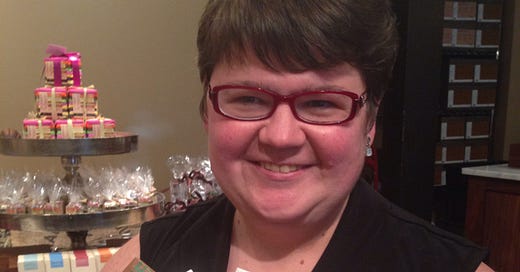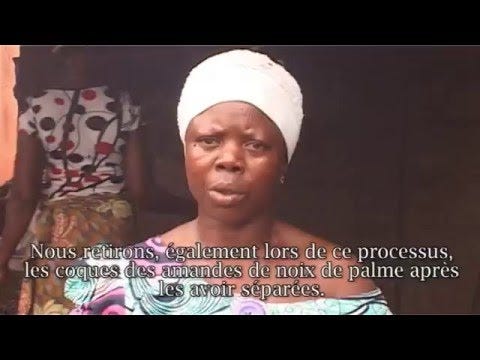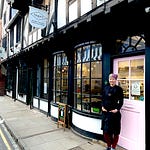Is there a truer expression than ‘water is life’? We all need it. I can’t go a day without thinking about water, drinking it, swimming in it (okay busted, I aim for two times a week); same with chocolate, it’s almost always on my mind. Before my interview with Dr. Romi Burks, Professor of Biology at Southwestern University , I had gone plenty months without contemplating the trajectory of a runaway snail. Alas, ‘Conversations in Cocoa’ always leave me thinking, always warp my ideas and perceptions to new heights. What can invertebrates teach us about chocolate? What happens when native species—or customs and beverages—move continents, cross oceans, and make “homes” in uncharted territories? When does something take hold in a new habitat, and at what point does the presence of this new occupier seamlessly adapt, wreck havoc, or completely shift the cultural or environmental milieu? Chocolate isn’t a 1:1 analogy with freshwater invasive species, yet its growth—its popularity and production, could certainly be viewed with an ecologist’s lens. Might this transient commodity provoke a roundup of sorts, and return to its original configurations and municipalities with zeal?
Chocolate enthusiasts of all walks of life eventually find themselves at the local watering hole talking about how their other areas of interest, past/current professions and passions overlap with cacao; this podcast was no exception. Whether you are an ecstatic dance teacher, a part-time ceramicist, or an aquatic ecologist, you will likely at some point, bring cacao into your dance circle, throw a mug for drinking chocolate on a pottery wheel, or compare the genome project of cacao with that of ampullariids. The cliché of all of this—or the gift staring right in front of us—is our innate connectivity. Everything we do in the moment impacts other living things at present, and the recent past swings back towards consequences for the future. Our cities and dwellings, traditions, economies—even our routines, are shaped by our experiences and external factors; very interestingly by our foodways—including those of candy and real chocolate.
Like Theobroma cacao, Ampullariidae (aquatic gastropod mollusks commonly referred to as apple snails), are native to the Amazon River Basin. Some species of these snails seemed to have entered the waterways of the northern hemisphere through the pet trade; they do fairly well in freshwater aquarium settings as they are convivial with most fish species. They are perhaps marketed by pet stores as proficient eaters of algae, thus making for a handy and economic cleaning unit—at least as young, small versions of themselves. Once they reach “apple” or baseball size, rather than terminate them, most pet owners will seek to release them in nearby rivers and lakes (the science-y term is ‘anthropogenic dispersal’). Populations have boomed, due to their frequent egg laying, voracious appetites, and even their ability to float—meaning that increasing rainfall and flooding can lead to the species traveling; greatly impacting the native waterways and deltas of the southeastern and southern United States, such as Alabama, Louisiana, Florida, and into Texas (where Dr. Burks and her students are working).
When reading through Dr. Burks synopses of projects and collaborators, there is a familiar sensation of peering into the scientific literature of cacao. Words and disciplines mentioned, such as: hybridization, biodiversity, phylogeography, genetic analysis, distributions of species—make for a certain high school science class sentimentality...or maybe that’s just me replaying vague scenes of Ferris Bueller’s Day Off in my head. Regardless, I am once again confident, a conversation about (in) cacao, is my antidote for :attempting to: figure out life’s strange and complicated proverbial bitter water and how we wade through it.
Dr. Romi Burks (@ProfRomi on Twitter, and photo credit above to her) has been incorporating chocolate education into her multidisciplinary courses since 2007, in which she asks students to consider the intersections of chocolate and biology—as well as social justice, politics, history, and genetics. In fall of 2022, she will lead a study abroad program on chocolate through Southwestern’s partnership with IES London (Institute for the International Education for Students). She has judged international chocolate competitions, actively supports chocolate makers and crafters, and speaks at chocolate festivals and conferences, such as the Dallas Chocolate Festival and Brighton Chocolate Festival.
Further links from this episode:
+ Dr. Burks presentation ‘The Biodiversity of Cacao: a Botanical View of Chocolate’ from the NW Chocolate Virtual Festival 2020
+ Comprehensive article on the predicament of the invasive apple snail
Professor Romi’s recommended books:
No Chocolate, No Monkeys by Melissa Stewart
Charlie and the Chocolate Factory by Roald Dahl
The New Taste of Chocolate by Maricel Presilla
You have just completed this newsletter and listened to an episode of Conversations in Cocoa. In this current edition and future episodes you will be invited to partake in interviews and other audio components that stem from the writings and newsletters found via this blogging platform. If you learned something, passed this on to a colleague, or want to support independent creators, please consider becoming a monthly or yearly subscriber. Word of mouth and member-support is of the greatest help to solo-entrepreneurs paving their own way, outside of the editorial constraints of traditional media publications. Connect with me and tag me via Twitter @wkndchocolate and Instagram @laurenonthewknd.
Disclaimer: All writings and recipes found on this website laurenonthewknd.substack.com, as well as the ‘Conversations in Cocoa’ audios hosted and produced by Lauren Heineck, are the original works and property of their author, Lauren Heineck. Attribution is required when citing this source and permission must be granted for outside publishing.













Share this post